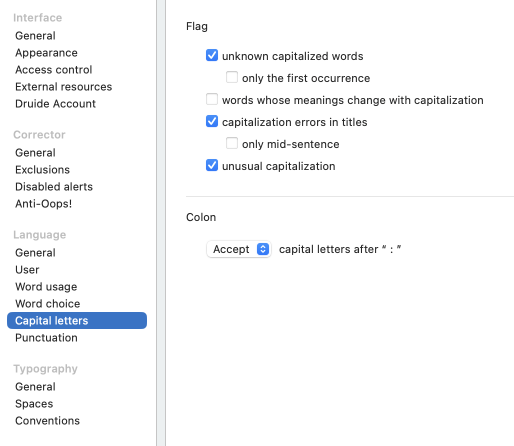Capital Letters Panel of the Language Settings

Flag
Unknown capitalized words
If the corrector encounters a word it does not recognize that begins with a capital letter, it assumes it is a proper noun. This allows it to continue its analysis. If you like, Antidote can alert you when it encounters an unknown word that it assumes to be a proper noun. We strongly encourage you to enable this setting. It warns you that the corrector does not know the word, and you can add it to your personal dictionary, particularly if it’s a name that you use often.
- This setting is enabled by default.
Only the first occurrence
If this setting is enabled, the corrector will alert you only to the first occurrence of an unknown word that begins with a capital letter. The alert will be disabled for subsequent occurrences of the word. However, the alert will be re-enabled if you exit the corrector and relaunch it. This setting can be useful if, in a given text, you use a proper noun several times but don’t want to add it to your personal dictionary.
- This setting is disabled by default.
Words whose meanings change with capitalization
Some words have different meanings depending on whether they begin with a capital letter or not. For example, advent refers to the time leading up to any event, while Advent refers to a particular period in the Christian calendar. If this setting is enabled, the corrector will flag such words.
- This setting is disabled by default.
Capitalization errors in titles
In English, the generally accepted convention stipulates that every word in a title should begin with a capital letter except articles, coordinating conjunctions and short prepositions. If this box is checked, Antidote will detect and correct all title case errors.
- This setting is enabled by default.
Only mid-sentence
If this setting is enabled, the corrector will only apply corrections relating to capitalization errors in titles when they appear in the middle of a sentence. This is useful if you’re writing a document that does not require title case in its own headings, but still want to correct capitalization errors referring to external titles within the body of text.
- This setting is disabled by default.
Unusual capitalization
If this box is checked, Antidote will flag words that include a capital letter for no apparent reason (e.g. *I Want to go.).
- This setting is enabled by default.
Colon
Depending on the conventions followed, independent clauses that come after a colon (“:”) can start with either a capital or a lowercase letter. This setting lets you instruct the corrector to require either lowercase or capital letters after a colon or to accept both cases.
- This setting is configured to accept both cases by default.